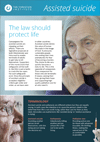Evidence against the legalisation of assisted suicide is being disregarded by activists seeking to change the law, experts say.
Instead of looking at the dangers that assisted suicide poses in countries where it has been legalised, campaigners are “resorting to scare tactics” which distort the truth and prey on the vulnerable.
An article in The Times earlier this month said that assisted suicide “has more support than ever”, but doctors and palliative care experts have refuted the claim.
‘Agents of death’
Baroness Ilora Finlay, a professor of palliative medicine and crossbench peer, said medical professionals do not want assisted suicide to be legalised.
The Peer also criticised the PR spin that has seen it rebranded ‘assisted dying’.
She wrote that the British Medical Association (BMA) found in an in-depth study that “doctors want to care for those facing the end of life and have no appetite to become agents of death”.
The legislation in Oregon, where assisted suicide has been legal since 1997, contains serious loopholes, the Baroness said, despite claims it is “watertight”.
Coercion
“It transpires that its criterion of terminal illness could include anyone with a chronic but managed illness that would prove terminal if the patient stopped taking medication”, she wrote.
“The quality of doctors’ assessments of requests for assisted suicide is not monitored. Coercion cannot be detected.”
She said Britain leads the world in palliative care, which means that the vast majority of people can die comfortably if they choose to stop treatment.
Lady Finlay added: “There is a world of difference between that and asking a doctor to supply or administer a massive lethal overdose.”
‘Greater concerns’
A joint letter to The Times, signed by senior doctors, also noted that there is no good evidence that assisted suicide is working well in other countries.
It said: “In the few jurisdictions that have gone down the ‘assisted dying’ road, the more evidence that emerges of what is happening, the greater the concerns.”


